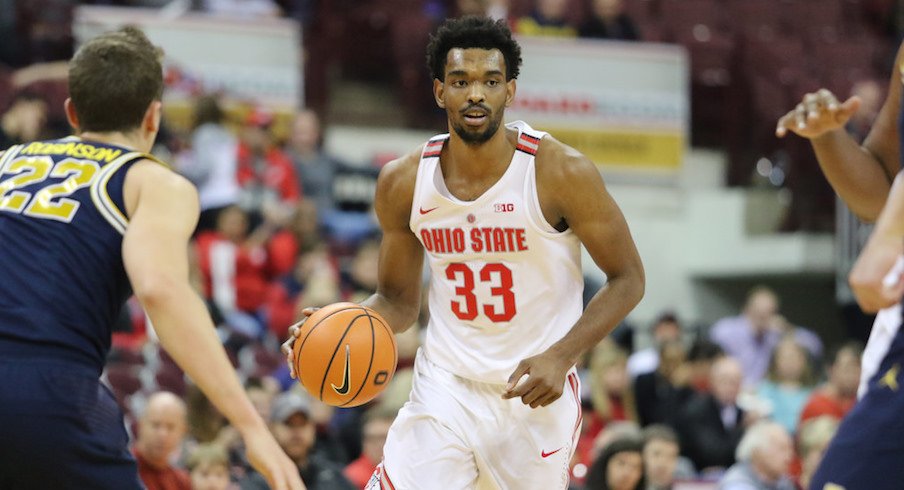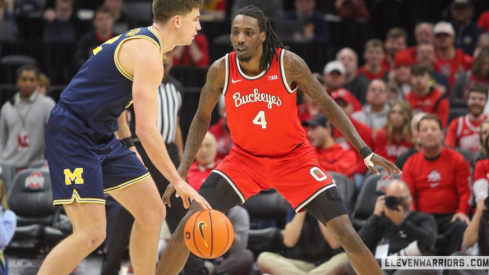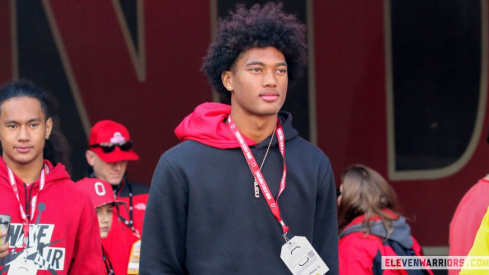It came as no surprise to anyone on Monday when Ohio State veteran forward Keita Bates-Diop declared himself eligible for the 2018 NBA Draft. The Normal, Ill., native spent four years in Columbus, earned his degree and leaves as the reigning Big Ten Player of the Year.
The question now for Bates-Diop becomes: how does he translate to the next level?
The 6-foot-7 forward has the length and size to guard multiple positions in the NBA, and played at least three different spots in 2017-18 for Ohio State, lining up at both forward spots and even at center. While he likely doesn't have the size to play center at the next level, his shot blocking ability (averaged 1.6 per game) and ability to stretch the floor make him a fringe first-round prospect, something he said Monday was one of the deciding factors in leaving a year early.
"I am extremely versatile, especially in today's game. So many people play so many different positions," Bates-Diop said. "You have to guard most positions, shoot the ball and do so many different things and I think I have shown especially this past year that I can do a lot of those things."
Bates-Diop has also shown an extremely consistent mid-range game offensively, which figures to translate well to the NBA. Chris Holtmann said Monday that if Bates-Diop gets to his spots consistently, he can continue to be a scoring weapon in the NBA.
"He is a big time shot-maker. I think he can do it at all different spots. Ryan Pedon has said this multiple times: Keita is maybe the best guy I have ever coached where you get him to his spot, and it's over," Holtmann said. "He is going to make something good happen. You just have to get him to his spot."
Because of a new rule passed two seasons ago, Bates-Diop could have tested the NBA waters each of the last two offseasons and still returned to Columbus. Teammates such as Kam Wiliams and Trevor Thompson took advantage of the rule in the past, but Bates-Diop said it wasn't until this year that he truly felt ready to take the next step.
"I knew I wasn't ready. I was very inconsistent my sophomore year and then junior year I didn't play. I knew I wasn't ready those two years," he said.
Bates-Diop said he consulted multiple people between Ohio State's final game and Monday to make sure he was making the right decision. He talked to everyone from former classmate D'Angelo Russell to AAU coaches who have sent players to the NBA in years before him.
“Keita is maybe the best guy I have ever coached where you get him to his spot, and it's over.”– Chris Holtmann
He said that the most consistent piece of advice he received was to not change who he was as a person.
"The biggest advice moving forward was just make sure you stay yourself," Bates-Diop said. "Don't try to do anything you're not accustomed to, get outside of your game or anything like that. Do what you do and you'll be fine."
While Bates-Diop's game projects well to the NBA, there are also some areas of his game that will need to improve. The biggest knock on Bates-Diop is that he struggles to play through physicality, something that bothered him at times during Big Ten play.
Holtmann said Monday that in order to help Bates-Diop improve in that area, the Ohio State coaching staff pushed the redshirt junior to perform just as well in practice as in games.
"We just tried to make sure that his approach every day, that he was committed to that. His effort in practice was almost like a game day effort, every single day," Holtmann said. "We felt that could improve his motor. We reminded him in the course of a game if he wasn't quite doing that. Keita owned that. He owned, 'OK, this is where I have to improve.'"
Holtmann also acknowledged that while Ohio State likely helped him in that area, it will still need to be an area of focus for Bates-Diop moving forward. Holtmann said he believes Bates-Diop is willing to improve on it because of the work ethic he displayed during his final season in Columbus.
"That is an area he has to continue to grow in and improve. I think he is aware of that and I think both the agent he signs with as well as the guys he trains with, as well as his future NBA coach, will continue to coach him up in that area," Holtmann said. "The best thing about Keita is he wants that. He wants the truth. I go back to our first meeting when we had a conversation. He wants to be told the truth. Good players want to be told the truth.
"He is going to play at the very elite level. In order to do that, he knows he has to continue to grow as a player and I think he is really open to that."
As Holtmann said, Bates-Diop isn't ignorant to the fact that he has areas of his game that need improvement. That said, the coming months ahead of June's draft will be critical for him to make the transition to the NBA.
"I have a lot to work on obviously and it is going to be an adjustment moving from a 30-game season to an 82-game season," Bates-Diop said. "That is what this offseason is for, that is what the training is for, to get my body and mind right."


